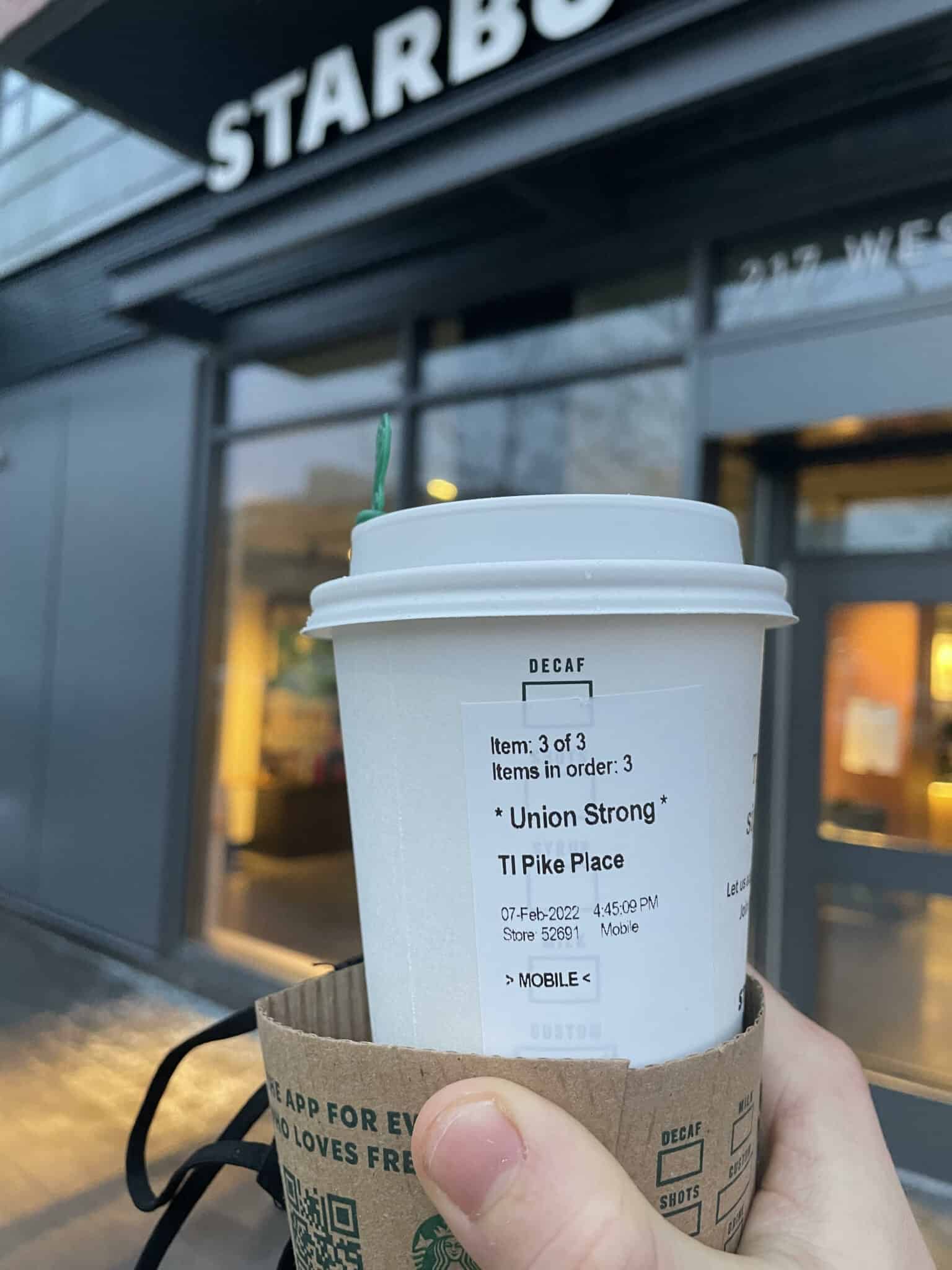
Kevin Vazquez is a staff attorney at the International Brotherhood of Teamsters. He graduated from Harvard Law School in 2023. The opinions he expresses on this blog are his own and should not be attributed to the IBT.
On Saturday, the Washington Post reported that Judge John L. Sinatra, Jr.—a Trump-appointee on the U.S. District Court for the Western District of New York—issued a highly unusual order requiring Starbucks Workers United to deliver documents, emails, texts, and other electronic communications between its members and “any digital, print, radio, TV, internet-based, or other media outlet” that it has contacted regarding its organizing campaigns. The order—little-noticed at the time, as the Post noted—was issued last month as part of the discovery process in the ongoing legal battle between Starbucks and the NLRB, which is seeking the reinstatement of seven Starbucks workers who it alleges were fired for union organizing in the Buffalo area earlier this year. It will likely include thousands of messages between union organizers and powerful news outlets such as the New York Times, Fox News, Vice, the Guardian, and The Washington Post itself, all of which must be turned over to the company.
The sheer breadth of the order, which is virtually unprecedented in labor—or, indeed, any—litigation, has astounded some observers, as the Post reported. It is rare enough for courts to order news reporters to reveal sources of certain particularly sensitive stories, such as those involving classified material or concerning national security, but it is essentially unheard-of for a court to order a party to turn over thousands of private communications to a third party. The order is all the more bizarre given that it arises out of a case in which the company—not the union—is being prosecuted for labor law violations. Starbucks claims that the order will permit it to “get[] to the truth and uncover[] misinformation” that the union has “disseminated to both our partners and the public,” though it declined to specify what misinformation or untruthful statements it was referencing. Union representatives, on the other hand, have a very different view of the situation: “This company has contempt for all the norms of democracy,” said Richard Bensinger, senior adviser of Starbucks Workers United and former national organizing director for the AFL-CIO, as reported by the Post. “They have contempt for freedom of the press and our right to freely speak to the media.” Many others agree, raising concerns that the required disclosure of private conversations could chill communications between journalists and their sources—potentially implicating the First Amendment. In any event, it appears virtually certain that the order is aimed squarely at Starbucks Workers United’s immensely successful organizing efforts and is dripping with disdain for workers’ exercise of their Section 7 rights. The union has appealed the District Court’s ruling to the Second Circuit, which has yet to take up the issue.
In other news, a LaborNotes piece published on Friday argued that unions should use their growing largesse to fund organizing and growth. Organized labor, the piece argued—relying on unions’ LM-2 financial reports—sits on a total sum of $31.6 billion in net assets, yet union membership has declined by more than 700,000 in the last decade, and only a fraction of those funds is spent on organizing. In that same period, unions have generated large budget surpluses and greatly increased their net assets, but, the piece contends, they have chosen not to deploy significant portions of those assets to facilitate organizing or promote growth. Instead, the labor movement—“to the degree it is pursuing any conscious strategy”—has adopted “Fortress Unionism,” which involves “buttress[ing] the areas in which [organized labor] is already strong” and “defend[ing] the remaining high-density regions, sectors, and companies,” rather than organizing new sectors. The article maintains that it is time to reject this approach, and, specifically, it calls for hiring 20,000 new organizers, boosting funding of workers’ centers and independent unions, and dramatically increasing strike activity, in addition to other activities. A more aggressive approach, the piece says, could “break the decades-long organizing stalemate in the U.S.” and substantially alter the organized labor landscape. Whether or not you are sympathetic to these arguments, the full article challenges the labor movement to engage self-critically, and it is worth a read.
Finally, on Saturday, Terri Gerstein, a fellow at our own Labor and Worklife Program at Harvard Law School, published a guest essay in the New York Times—“Don’t Buy the Republican Appeal to Workers”—criticizing Republican senatorial candidates, such as J.D. Vance in Ohio and Mehmet Oz in Pennsylvania, both multi-millionaires who built their fortunes far from the Midwest heartland which they claim to represent, for attempting to recast themselves as champions of the working class. “As November’s midterm elections near,” she writes, “many Republican candidates are all about pickup trucks, bluejeans and guns, as they perform the role of champions for the working stiff.” This “working-class veneer,” however, is merely “playacting,” as the Republicans’ position on workers’ rights makes “crystal clear”: they oppose a $15 hourly minimum wage, paid sick leave, and workplace safety protections; they block labor law reform and “starve” the NLRB of funding; they have sued to stop planned wage increases for nearly half a million people working for federal contractors; they opposed extending or expanding the monthly child tax credit that halved child poverty rates during the pandemic; and they prematurely eliminated federally funded unemployment benefits to workers during the pandemic. At every turn, rather than embrace policy positions that would legitimately strengthen unions or otherwise materially benefit the working class, these Republican politicians—themselves multi-millionaires or billionaires—lean fully into cultural grievance, fabricated outrage, and hysteria to rail against “elites” and portray themselves as tribunes of the plebs while their economic policy agendas, supported by the oligarchical corporate interests that finance their campaigns, intentionally bleed workers and unions dry.
This argument will be familiar to many who have watched with revulsion as Republicans have ludicrously attempted to brandish the working-class mantle while pursuing the same regressive “pro-business” policies that have crushed workers and redistributed wealth upwards for decades. Indeed, a similar argument—“The Republicans Party Has Nothing to Offer the Working Class”—was presciently advanced in OnLabor last year. Regardless, these rebranding efforts, however absurd, have borne bitter fruit, and a disconcerting fact remains: the Republican voting base is, in fact, becoming increasingly working-class, and the Democrats’ increasingly affluent and suburban. It is of course true that Republicans have nothing to offer workers—but it is telling that so many working-class voters (of virtually all races and ethnicities) nonetheless feel increasingly drawn toward the Republican Party. This may speak as much to the shortcomings of the Democratic Party as to the misinformation propagated by the Republicans, and it should perhaps serve as a warning that the Democrats must wholeheartedly embrace labor and prioritize the material interests of working people if they wish to quell the working-class defection from the party. In any event, we will find out early next month whether these Republican tactics have any purchase with working-class voters or whether they will be rejected for the snake oil that they are.






Daily News & Commentary
Start your day with our roundup of the latest labor developments. See all
April 22
DOL and EEOC beat the buzzer; Striking journalists get big NLRB news
April 21
Historic unionization at Volkswagen's Chattanooga plant; DOL cracks down on child labor; NY passes tax credit for journalists' salaries.
April 19
Alabama and Louisiana advance anti-worker legislation; Mercedes workers in Alabama set election date; VW Chattanooga election concludes today.
April 18
Disneyland performers file petition for unionization and union elections begin at Volkswagen plant in Tennessee.
April 18
In today’s Tech@Work, a regulation-of-algorithms-in-hiring blitz: Mass. AG issues advisory clarifying how state laws apply to AI decisionmaking tools; and British union TUC launches campaign for new law to regulate the use of AI at work.
April 17
Southern governors oppose UAW organizing in their states; Florida bans local heat protections for workers; Google employees occupy company offices to protest contracts with the Israeli government